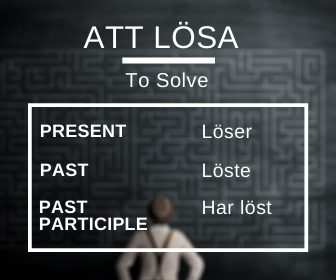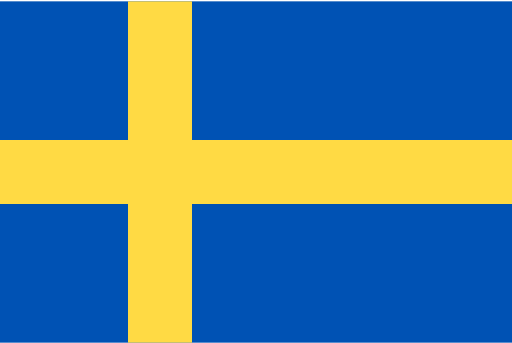
Hey all! I’ve gone down another rabbit hole of Swedish words while I was studying, and wanted to share my findings with you. Today’s topic will be on the origins of words relating to “solve, solution, and setting loose”. The ultimate goal is to be able to build up a larger vocabulary by knowing the roots of a few simpler words. As always, I’m not a professional and am still learning Swedish myself. Sometimes these posts are me thinking out loud and making connections as I study, so please jump in with corrections!
Swedish word origins
The first building block to take a look at here is the Swedish verb “att lösa”, which directly translated means “to solve”. There doesn’t seem to be an immediately apparent relation between the words, but I found a few tricks to help build the connection and find related words.
Going back a little further there is a Proto-Germanic reconstruction with the same meaning “lausaz” (loose, free, empty, devoid of) that appears to be the origin of many of these related words across several languages.
The closest connections I found to Old Norse are:
- “leysa” – to loosen, unravel, or set free
- “lausn” – to release, or a solution
- “lauss” – the adjective sense of something being loose
“Leysa” appears to the be the predecessor of “lösa”, and you can think about this in terms of a solution being the loosening, or unraveling of a problem. The English word “solve” appears to come from Latin “solvere” (loosen, solve, explain, break up, seperate), but I’ve lost the trail around there so maybe someone can help fill in those gaps.
Where “leysa” had that sense of unraveling and solving, “lausn” gives Swedish some interesting words with a sense of “setting free”. The word “Lösen” can be shorthand for “lösenord” (password), or “lösensumma” (ransom). Depending of which original sense of the words helps you remember best, you could think of “lösenord” being “the solving word” or “the word that sets free”. You could do the same with “lösensumma” being “the amount that sets free”. These are pretty literal translations of what those words mean when you really dig into them!
“Lauss” gives us the adjective “lös” (loose) and very possibly could be the ancestor of the English word “loose”. You can say “en lös tand” and very simply translate that to “a loose tooth”.
Building Vocabulary
Now that a bit of the history is out of the way, let’s look at how to build related word lists based on these root meanings. One you know the roots and how to think about words, it gets easier to see new words with different prefixes and suffixes and guess what they mean.
Now that we know that the origin of most words with “lös” or “lösa” mean something like “to set free, to unravel, solve, a solution” or “loose, less, and devoid of” we can start modifying the base words. Here’s a list of examples.
Suffixed Words
- meningslös – meaningless, pointless
- medvetslös – unconcious
- interesting compound word here – Med (with) vet (knowing) lös (less). Strange to translate, but something like “knowing-less”, or “without knowing”
- aningslös – clueless
- arbetslös – unemployed
- Literally – “workless”
- värdelös – worthless
- hjälplös – helpless
- hjärtlös – heartless
- hopplös – hopeless
- smaklös – tasteless
- skamlös – shameless
- sömnlös – sleepless
- laglös – lawless
Other Combinations
- En lösning – A solution
- Avlösa – To take over or relieve someone of their shift at work, also to absolve
- Avlösning – Absolution
- Löslighet – Solubility (of a chemical solution)
- Olöslig – Insoluble
- Lösdrivare – a vagrant or vagabond. Literally, someone without drive (as in motivation)
- Löständer – Dentures (This is kind of hilarious, I can’t figure out if it’s supposed to mean loose teeth, or solution teeth!)
I hope that helps! Let me know if you come across any other interesting uses of these words, or any more history from other languages. I’m always fascinated to learn and make new connections. Thanks for reading!

Hi, I am Swedish and find your blog really interesting and fun, thanks!
I have some thoughts on this post:
“Avlösning – Absolution”. I am not aware of this meaning. This could be because it’s archaic or due to some void in my vocabulary but either way I don’t think this is going to be a very useful translation. “Avlösning” would be the act of “lösa av” or the person/persons that do the relieving or takes over the responsibility. “Absolution” would, to my mind, best be translated as “förlåtelse” or “absolution” in the religious sense and “frikännande” in a legal sense.
“Lösdrivare – a vagrant or vagabond”. This is a good translation but your derivation is probably not spot on. “Driva” in this context means something like “aimless wandering” or “drifting” (the latter probably sharing a root in both languages). I realize that “drifter” would probably also be a good translation of “lösdrivare”. Much like “vagabond”, the word “lösdrivare” is not used all that much anymore.
“Löständer – Dentures”. I’m guessing you just made a joke but in this context “lös-” means “detachable”. In the same way a novelty “fake nose” is called “lösnäsa”.
Bonus: “tandlossning” is the loosening and subsequent losing of teeth, the remedy of which might be “löständer”…
Glad you enjoyed it, and thanks for the feedback!
Absolution is definitely also starting to be archaic in English other than the religious sense, so maybe not the most useful word, but I thought it was an interesting connection in any case. It’s the religious version that sparked the connection in my mind, in that to absolve someone of their sins literally means to relieve them of the responsibility for them. Forgiveness/förlåtelse is still probably a better modern translation of that.
For lösdrivare the derivation was a bit of a guess. I know that you can describe a person as being driven, or having a strong drive using “driv” , as though they have a quality that metaphorically propels them forward (in life). I would describe a person without drive as aimless, which is not as strong as calling them a drifter or vagrant, still carries the same sort of connotation.
Thanks for clearing up the denture subject! Lös = detachable makes perfect logical sense, but still makes me think that it’s something in danger of falling out. Discussing these meanings definitely helps my learning process.
Tusen tack!